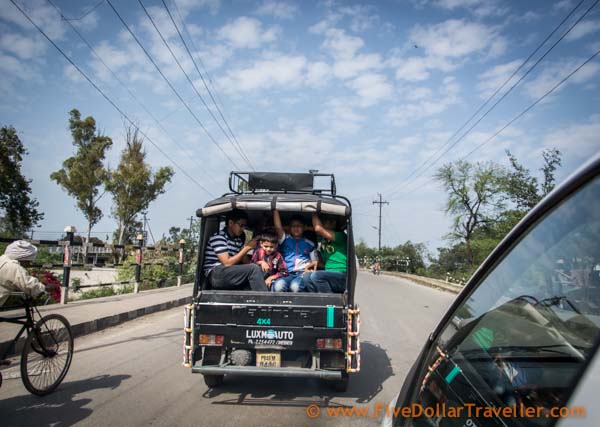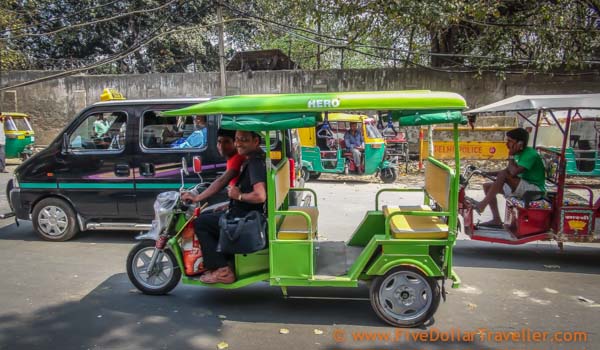Taxi drivers all over Asia know how to extort foreigners, and locals.
We’ve encountered our fair share of Asian taxi scams but North Indian taxi drivers are by far the most sneaky.
Even the most experienced traveller can easily fall prey to some of the lesser used tricks. Not all of these are hardcore scams exactly, some are just ways to eek a few extra dollars out of ignorant foreigners.
But if you are taking taxis/tuc-tucs everyday then the costs can add up. Even if you only overpay by two or three dollars per day, for long term travellers, like ourselves, $3 per day adds up to over $1,000 per year total – almost 1 month’s budget for us. I know where I’d rather spend $1,000 than on being overcharged. If you really don’t know what your doing then you can easily be paying more like double to five times the going rate – and that can add up very quickly.
The main thing you should understand is that tourists are not legally expected to pay more than locals, ever. If you are being seriously overcharged, find a policeman – or at least threaten to – and don’t pay up until they mediate for you.
Here are the top 16 Asian taxi scams we’ve encountered that separate you from your cash… Bare in mind, some taxi drivers are honest but you should always be vigilant. Regardless of all the scam info below, on the whole, I’d suggest pushing to get taxis to run the meter as a first option – work from there.
All of these scams have been attempted on us in India, most of them in other parts of Asia too. I’m using Indian prices for example. Rates vary across Asia but the scams are often the same.
1. First time traveller Asian Taxi Scam
This is the most basic scam in the whole of Asia and especially happens at international airports where they assume foreigners arriving are new to the country.
There are two regular forms:
- First time travellers don’t know how much cheaper Asian taxis are than back home. You’ll be quoted a price similar to what you’d pay back home, and not knowing any better you’ll agree.
- You don’t realising that the taxi will not run the meter or that you should barter a price in advance. You’ll get in the taxi, arrive at your destination and then be hit with a massive overcharge.
Solution:
The easiest way to avoid this is to look up online the average taxi fees for the country you’ll be visiting. With airports, specifically, wiki travel normally has guideline fees, so search for the city in question. Then barter for the price.
Many airports have “taxi mafia” with price fixing – more on that next. Even buying from the prepaid stand inside the airport will often incur a higher fee than walking out to the main road and hailing a regular cab.
In India specifically, the pre-paid taxi stands are often run by the police. If they are staffed by someone in uniform then they’ll normally charge an honest price. Once the cops clock off however, drivers will just lie about the fair price under the guise of being police licensed.
2. The Taxi Mafia
Common throughout Asia. When all the taxis at an airport, railway station or bus station are in it together and organised by touts. Prices will be fixed way too high and bartering will fail as every driver you try is “in on it”.
Eventually, tourists just agree to overpay as they don’t want to walk around with heavy bags. Or they just assume they’ve been offered the right price as they can’t get any lower quotes.
Solution:
The easiest solution is to walk just outside the arrival area to the main road and hail a non-mafia controlled cab. At Qingdao airport, China we were quoted $15 for a $2.50 cab ride. We actually had to walk onto the main highway – the only exit. 5 minutes later we hailed our $2.50 ride.
3. Meter scams
If you do end up getting a taxi/tuk-tuk that will run the meter – many won’t – there are two standard tricks with tampered meters.
- The meter will jump suddenly. A big jump. So keep your eye on it, if it does, scream blue murder at the driver until he lets you out the cab or drops the fee. Threaten to report him to the authorities if he doesn’t.
- The meter will increase a lot faster than the legal rate. 8 to 15 rupees per KM in a tuc-tuc (auto) is standard. In India, the ambassador cars or modern taxis can run near to 20 rupees (2014 rates). Depends what city you are in.
Solution:
Check the meter rate for the country you’ll be visiting http://www.taxifarefinder.com/. Be aware that this site doesn’t always distinguish between different types of taxi (ie. Air con cabs/ Tuk-tuks etc)
Or just do a google search for “taxi rates *City Name*”
4. Distance scams
When bartering a fixed price, you will normally be over quoted. If you know the correct distance, and tell them so, they will normally respond by telling you it is much further. It hasn’t caught on yet with drivers that foreigners can easily check exact distances on their smartphones.
Solution:
Tell them again the exact distance. If they don’t give you a fair price (8-15Rs per KM plus sit down fee of around 15 to 25Rs – which includesthe first KM or so) then walk away.
5. The “Runaround” scam
I think everyone will be familiar with this as it happens to tourists in countries worldwide.
Specifically in Asia, if agreeing to go by meter, some drivers will take the extra scenic route to up the bill. They assume you don’t know the area so its easy to take the long route and you won’t complain.
Solution:
Bartering a set price will save you time as they will go the quickest way. Knowing the exact distance in advance is always the best way to get a good price. However, in China we found the meter is the best option, same for Air con cabs in Bangkok.
If you have maps on your phone, keeping an eye on where you are heading can be a good solution.
6. Late night surcharge
After sometime between 9pm & midnight, surcharges may apply. These charges are legitimate (in India at least) but drivers will often try to overcharge as much as possible. 20 – 25% surcharge at most should be paid if agreed in advance. In Mangalore, the late night charge is actually an extra 50%.
Solution:
Ultimately, if bartering, the final price for total trip and all passengers should be agreed. Don’t prompt them about the late night surcharge, just understand that if they are quoting 20% over and you’ve tried at least a couple of drivers that it might be the time of night. Either keep bartering or take the ride.
Ask a local or policeman when you arrive at the bus/train station if there is a late night fee.
7. Parking/Waiting Scams
Your destination, especially if it is an airport, may have a parking fee. Generally for drop off, taxis do not pay a fee. Although some airports may impose a fee, an unscrupulous driver might try to charge you one even though they don’t actually have to pay it. Alternatively, they may ask you to pay a fee much higher than the real price.
Solution:
Tell the driver you will pay the parking fee direct to the parking authority, not to him. Wait and see if there is a sign on entry to the airport and then point it out to the driver and only pay the required amount.
Alternatively, pretty much anywhere that your rickshaw may have to park whilst waiting for you, they may ask you for a parking fee or a waiting fee. For parking, if there is no attendant collecting money then there is probably no parking fee. Waiting is normally charged at 25 rupees per hour, negotiate before leaving the cab how much the waiting fee will be.
8. Return trip charge
We haven’t figured out if this is really a scam, sometimes it probably is. The driver will tell you that the location you need to get to cannot be booked as a one way trip because he will not be able to get another fare in that area.
If you are going somewhere remote, this does sort of make sense. Legally speaking it may not be your responsibility but that said, if no driver will take you for the one way fare, you don’t have much of a choice.
Solution:
Either book them for the roundtrip with a small waiting fee, or take a bus.
9. “It’s raining” or a “public holiday”: price bumps
Prices do not increase because it is raining. But demand for taxis does go up so they can get away with charging more to both locals and tourists. It’s your call how long you want to wait to get a taxi.
As for public holidays, with the amount of religious holidays in Asia, especially India, drivers could either be making up that it is a holiday, or not. Either way, prices do not legally increase on holidays. However, on Holi festival there were a lot less taxis around so the supply and demand issue came into play.
In any situation where the driver could easily get another, higher fare, expect a price rise.
10. Traffic
There is a basic “wait fee” for taxis. On average it’s free for the first 10 minutes and then 25 rupees per hour. If you are on a meter it is automatically calculated. If not, they may ask for more if they’ll be heading into heavy traffic. It’s up to you to decide what is fair on this one and agree in advance.
Solution:
I’d normally explain to the driver in advance of climbing in, if there is no traffic I’m not paying the extra at the end, then communicate with them as you travel to point out there has been no traffic, if that is the case.
11. Tolls and exit fees
Just like parking fees, tell them you will pay as you go for any tolls. Don’t agree a total price in advance to include tolls.
Sometimes they will take toll road routes because it means less traffic for them. The tolls aren’t normally that high so it is normally a win-win unless you are penny pinching to the max.
12. Charges for additional people

We’ve seen 10 people loaded in a tuc-tuc plenty of times. Strictly speaking you shouldn’t be asked for extra money if there are 4 of you rather than two of you, for example. They may try.
Solution:
If they only ask a small surcharge, 10% or so, it’s ok if you don’t care too much. If they are asking double – some will! – walk away.
13. Asking for tips
Most Asian countries do not have a culture for tipping taxi drivers. Many will ask foreigners for a tip because they know foreigners think it is appropriate to tip. We normally only tip a driver who has also been a guide and has gone above and beyond. 5 to 10% tops.
Some drivers will just keep your change, without asking, as a tip, which leads me to the next scam…
14. “No Change” Scam
Many taxi drivers will insist they have no change. They normally do though.
Solution:
Firstly, you actually have to ask for change, no matter how far over the bill you have paid. If they say they have no change either sit in the car until they give you change, or, if you have the option, jump out to the nearest store and get change, before giving them anything, then pay exact.
It’s always better to try and get the correct change in advance of getting in the taxi.
15. Air Con Price Hike
I’m not sure this is a scam but its worth noting (leave us a comment below if you know the answer).
If you happen to hail an aircon taxi they may say on the side of the cab “same price as regular taxi”. The meter does run at the same rate but the driver will ask for a 25% “aircon fee” at the end of the ride.
Apparently the taxi ride “is the same price as normal taxi, but aircon extra”.
Solution:
Ask before they turn the aircon on if there is an extra fee. Then you can decide if you want it.
16. Free Taxi Scam
This one has been popular in Bangkok for years but exists elsewhere. We got caught out by the “double bluff” variation in Kerala recently.
There are two versions:
- The bluff: They take you to some second rate tourist attraction you don’t want to go to, instead of where you asked to go, then to a shop. Whilst you are browsing they collect a petrol voucher, then they ditch you as soon as possible and you have to pay another driver full price to get home.
- The double bluff: They tell you that they’ll take you where you need to go for free, all you have to do is go into a shop first, as a favour, so they can get the free fuel voucher. When you come out they make some excuse about a family emergency and head off to get another tourist and some more free fuel.
Solution:
Neither of these have to cost you money, although the average tourist will probably bow to the hard sell in the shops and buy some shitty over priced souvenir. These scams are a complete waste of your time though!
—————————
Ultimately, taxi drivers in Asia fight tooth and nail for tourist money because the basic rate they earn on the meter is pretty low. Foreigners are their cash cow. There quality of life, unless they are excellent at extorting people, probably isn’t close to yours.
We rarely get to pay the lowest, local price possible. It’s just not worth haggling over 20 cents on a daily basis. We do object to any blatant rip-offs though. So should you.
If your driver is lovely, and doesn’t overcharge more than 10% or 20% then give them a tip if you feel bad about it all.
———————-
Have you encountered any other taxi scams in India or elsewhere in Asia? Let us know in the comments.
Or, Signup to our mailing list to get more useful travel tips and money saving advice:


















8 Comments
Illia
April 28, 2014A very good article, we’ve run into each and every of these scams!
Also, in Delhi, for example, there’s a scam, when drivers agree to a reasonable price, but then drive you to a souvenir shop which can be located hell knows where (‘just look, no buy!’), and refuse to drive you from there to your destination point until you buy something expensive.
In this case I recommend to actively refuse to go to the shop every time a driver mentions it and tell you’ll call tourist police. They will either stop and tell you to go out or gloomy drive you to your destination point.
Tom Williams
April 29, 2014Thanks for the comment and info Illia. Sounds like you got hit by an even more aggressive form of the shopping scam. Ouch!
Rachel of Hippie in Heels
April 30, 2014These make me laugh; I deal with these on a regular basis! I’ve gotten used to it after living here almost 2 years- but as I will always look like a tourist, they will always try! haha Good tips!!
Tom Williams
April 30, 2014Thanks for the comment Rachel. We’ve been in Asia over a year now. We certainly have to laugh at some of the outrageous prices we’ve been quoted 🙂
Anna
May 15, 2014Never, ever believe them when they say your hotel is closed, burnt down, fully booked, no good etc the taxi driver is just trying to take you to his friend’s shop, a hotel where he can get paid a commission or an unoffical tourist office where they will rip you off. Sometimes its so hard and frustrating just getting taken to your chosen destination in India! Good post though – wish I had read this before I went to India!
Tom Williams
May 17, 2014Thanks for you comment Anna. It’s Sad but true.
We’ve experienced lies on a daily basis. “No bus today, must take my taxi”. “No train to that station, must take my taxi”. “I know nice hotel for you” then they drive around for 30 minutes in circles. We basically don’t trust any taxi driver for information EVER and always find a policeman or local to get information before approaching any taxi.
Anna
May 19, 2014Yes, you really can’t trust what anyone says in India. Your tips are really useful although don’t always trust people in uniform or policemen either – in Delhi, despite trying to avoid these taxi scams which we were well aware of, we made the mistake of trusted the uniformed security guard who set in montion a text book scam that left us scared and abandoned in a dodgy area of Delhi in the middle of the night. I wrote more about it on my blog http://global-gallivanting.com/delhi-nightmares/ I would advise booking an airport transfer from a hotel if arriving somewhere like Delhi late at night!
Tom Williams
May 19, 2014Thanks for the info Anna. Sorry to hear you got caught out. It happens to all of us at some point.
Its fair to say there are definitely some fake police/security types getting around. Its very sad that they are getting away with such scams.
If arriving late at night the pre-paid, official police run taxi desk inside major airports is certainly the safest option.